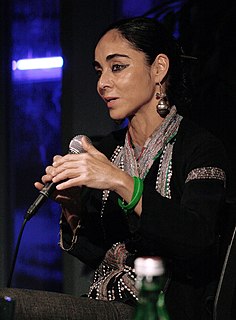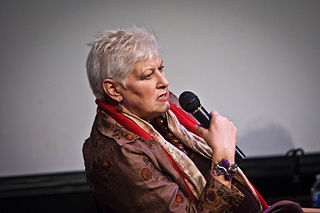A Quote by Shirin Neshat
Magical realism allows an artist like myself to inject layers of meaning without being obvious. In American culture, where there is freedom of expression, this approach may seem forced, unnecessary and misunderstood. But this system of communication has become very Iranian.
Related Quotes
The Americans only like things they can label, even if it kills them. Think of those poor Latin American writers. Some of them are very good. But the "magical realism" label has absolutely ruined them. The critics are like tourists who return from a trip saying they've "done" Machu Picchu: "Okay, we've done magical realism," so now we can throw it out.
I think being raised within a Mexican Catholic family made magical realism a very natural part of who I am as a person and as a writer. My parents always told us great stories that often had magical elements and roots within Mexican folklore. Also, I remember my father reading a book to me, when I was very young, about the lives of saints. Those were crazy scary stories! Maybe he was trying to scare me into being a good person. In the end, magical realism offers me untethered freedom to explore human frailty and the way we clumsily cobble together our lives on this strange planet.
I was born in Iran, left at a very young age-less than a year old-and grew up and was educated in the West. I grew up thinking of myself as an American but also, because of my parents and the Iranian culture that was in our home, as an Iranian. So if there's any such thing as dual loyalty, then I have it-at least culturally.
All manners of freedom, including freedom of expression, freedom of conscious, freedom of thought...it accepts tolerance. But it is not an atheist society. Religion is the private affair of an individual...be present in the public domain, but state has to be clearly separated from religion. When I'm speaking, I'm speaking only for myself. At the same time, I know that these ideas have wide support among the Iranian population.
Before Gutenberg, there was this really very strong oral storytelling culture where being able to relay stories from person to person was sufficient. And then, with the introduction of printing and mass communication, suddenly somebody had a lot of authority invested in the idea of a single canonical expression of a document or a piece of communication.
I have a theory about American men -- I think they think women are boys who don't know how to throw a ball very well. American women are forced into the role of being men without penises, of being men who haven't quite been able to make it. If women don't want to be pussycats, then they get forced into the role of being almost as good as men. Which is lousy.
An artist requires the upkeep of creative solitude. An artist requires the healing of time alone. Without this period of recharging, our artist becomes depleted. Until we experience the freedom of solitude, we cannot connect authentically. We may be enmeshed, but we are not encountered. Art lies in the moment of encounter. We meet our truth and we meet ourselves and we meet our self-expression.






































